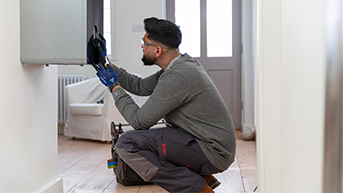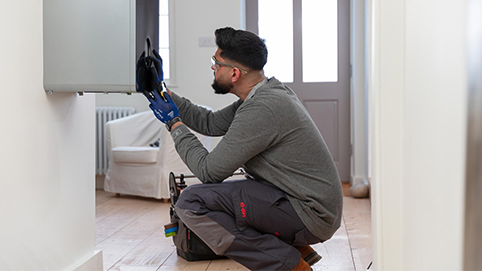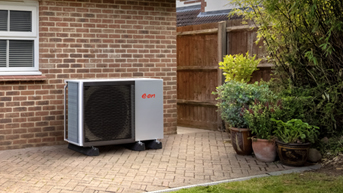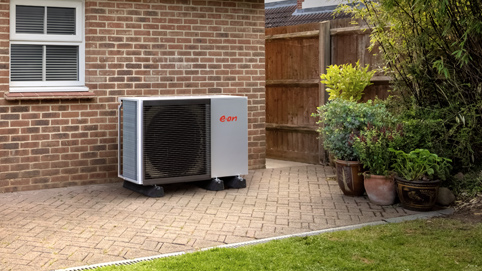UK gas boiler ban: exploring better heating solutions
2025 and beyond: what the Government's boiler ban means to you.






What is the gas boiler ban in the UK?
So, what exactly is the gas boiler ban? Well, it's a bold move by the UK Government to tackle the challenge of greenhouse gas emissions. Starting in 2025, new build homes will no longer have the option of installing conventional gas boilers. The primary goal is to reduce our carbon footprint and move towards cleaner and more sustainable heating solutions. Gas boilers are a significant source of carbon dioxide emissions, contributing to climate change. We believe it's time to take action for climate, and by phasing out gas boilers, and turning to ‘cleaner’ heating solutions, like air source heat pumps, we can make a significant positive impact on the environment.
How will the boiler ban affect me?
The boiler ban will mostly impact property developers involved in the construction of new-build homes, meaning that from 2025, they won't be able to install gas boilers in their residential developments.
Developers will now need to adapt to this new regulation and ensure that their projects comply with the requirements set by the Government. This change presents an opportunity for property developers to embrace sustainable and energy-efficient solutions in their projects, appealing to environmentally conscious buyers.


Will I have to replace my boiler after 2025?
The boiler ban doesn't directly affect homes with existing gas boilers yet, but the Government's current plan is to ban the installation of all new gas boilers from 2035.
If you need to replace your current gas boiler in the near future, then a new gas boiler could still be the right solution for you. A new boiler will almost certainly be more energy efficient than your old one, and by changing the way you operate your central heating system you could further reduce the amount of gas you burn, and CO2 you add to the atmosphere. We'd also recommend smart heating controls, thermostatic radiator values and lowering the temperature of your radiators to cut the amount of energy you use.
However, you may want to start thinking about when's the right time for you to move to a new way of heating your home. Currently, grants and schemes are available to help with the cost of installing replacement heating technologies such as air source heat pumps, which will help. Also it's almost certain that changing to a new heating technology will cause some level of disruption to your home, so it’s a good idea to consider when would be the best time for you to upgrade your heating system.
How central heating systems could change
The ban on gas boilers means we need to start thinking about new ways to heat our homes. One good option are air source heat pumps (ASHPs). ASHPs are electrically powered and take heat from the air outside and use it to warm up the inside of a house, similar to how a fridge works but in reverse. By doing this they can provides 3 or 4 kilowatt-hours of heating for every kilowatt-hour of electricity consumed. ASHPs work most efficiently when the whole central heating system has been carefully designed for the property it's installed in, and of course ensuring the home is as well insulated as it can be.
In the case of new build properties, heating engineers and architects working to current building regulations ensures that homes are comfortable to live in, and efficient to heat.
If you're replacing an existing heating system, then be aware that for ASHPs to be efficient they need a different approach to heating your home. The hot water they circulate to your radiators won't be as hot as with a gas boiler. This means you will need larger radiators to ensure your home's kept to a comfortable temperature. You might even want to consider installing underfloor heating which works very well with ASHPs. It's also important that you pick the right supplier when you decide to switch to an ASHP, to ensure that your new heating system is tailored to the needs of your home.
You might also want to consider using other technologies alongside your air source heat pump, like solar panels, to be even more energy efficient.


Will an air source heat pump save me money?
Even though the initial installation costs of ASHPs are higher than traditional boilers, today they are cheaper to run than oil or LPG boilers, and not a lot more expensive to operate than using mains gas. Over time it's expected that the price difference between gas and electricity will change, making even gas central heating more expensive than electrically powered ASHPs.
If you already use electricity to heat your home, then an ASHP is significantly cheaper than using storage heaters. The Energy Saving Trust, have predicted savings of up to £1,100 per year compared to using an old electric storage heater.1
Plus, the Government currently offer incentives and grants to help with the installation costs, such as the Boiler Upgrade Scheme, which saves you £7,500 on the inital installation cost, which makes renewable heating even more appealing.2
To make air source heat pumps work even better, you can use smart heating controls and adjust the system settings. These things help you save even more energy and reduce your impact on the environment. And the best part is, you can still enjoy a comfortable home whilst being energy efficient.
Can my home be retrofitted with a heat pump?
In most cases your home can be fitted with an air source heat pump, which would replace your traditional gas boiler, electric storage heaters or direct electric heating. However, there's a few things to bear in mind.
- To access the Government’s Boiler Upgrade scheme (BUS) grant you'll need a valid Energy Performance Certificate for your home.
- Before installing an ASHP you should ensure that your home is as well insulated as possible.
- You'll probably need to replace some or even all of your radiators with larger models.
- If you currently have radiator pipe work of less that 15mm diameter then it'll probably need to be replaced.
- If you currently have a combi boiler you'll need a hot water cylinder installed. If you already have a cylinder it'll need to be replaced with one that's compatible with an ASHP.
What are the other alternatives to traditional boilers?
As far as replacing your boiler in the future, air source heat pumps are a great choice, but there's other options too, depending on your needs and the type of property you have.
Ground source heat pumps are super efficient, but they need enough outdoor space and cost more to install. Biomass boilers use natural materials as fuel, but they need regular upkeep and a steady supply of fuel.
Sometimes, it's a good idea to combine different renewable technologies for the best results. For example, you can use solar power along with an air source heat pump to reduce your reliance on the grid even more.
So in the years ahead it's now even more important for builders and homeowners to think about these different choices, like how much they cost, how much space they need, and what the local rules are. By doing that, they can make the best decision for their own situation. When you pair your solar panels with solar battery storage, you're utilising even more of the power you generate.


Moving away from traditional heating methods, and embracing new technologies requires a shift in mindset and collaboration amongst property developers, architects, engineers, and homeowners.
By prioritising energy efficiency and building sustainable homes, we can create cosy and 'greener' homes that not only benefit the environment but also provide comfortable living spaces for generations to come.
1. Potential annual savings of installing a standard air source heat pump in an average sized three-bedroom detached home with an old electric storage heater, and dependent on the current electric storage heater used, its age and your household electricity usage. Figures are sourced from the Energy Saving Trust website and are based on fuel prices as of July 2023.
2. The Government’s Boiler Upgrade Scheme is valid for heat pumps that are commissioned from April 1st 2022. To be eligible for the grant, a valid Energy Performance Certificate (EPC) from the last 10 years, with no recommendations for cavity wall or loft insulation is required. Unfortunately, new build homes are ineligible for the Boiler Upgrade Scheme £7,500 grant.
For more information on air source heat pumps, boilers and insulation, visit our installation terms and conditions hub.